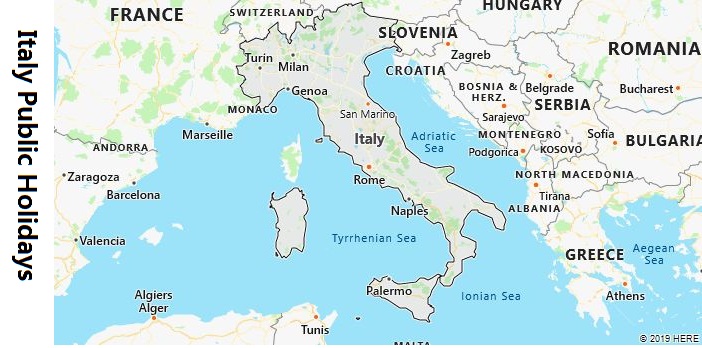Italy Holidays
Italy Public Holidays
Searching for the national holidays in Italy? All public holidays in Italy are treated like Sundays. This means that most of the Italy employees have a day off and all schools are closed on these office holidays. If you are planning a trip to Italy and want to know what the national and regional holidays are, check the details in the tables below.
List of Official Holidays in Italy for Year 2020
| # | Date | Holiday | Day |
| 1 | January 01, 2020 | New Year’s Day | Wednesday |
| 2 | January 06, 2020 | La Befana | Monday |
| 3 | March 19, 2020 | St. Joseph’s Day | Thursday |
| 4 | April 13, 2020 | Easter Monday | Monday |
| 5 | April 25, 2020 | Liberation Day | Saturday |
| 6 | April 25, 2020 | Feast of St. Mark | Saturday |
| 7 | April 28, 2020 | Sardinia Day | Tuesday |
| 8 | May 01, 2020 | Labour Day | Friday |
| 9 | May 10, 2020 | Mother’s Day | Sunday |
| 10 | June 02, 2020 | Republic Day | Tuesday |
| 11 | June 24, 2020 | Feast of St. John the Baptist | Wednesday |
| 12 | June 29, 2020 | Saint Peter and Saint Paul | Monday |
| 13 | July 15, 2020 | Feast of St. Rosalia | Wednesday |
| 14 | August 15, 2020 | Ferragosto | Saturday |
| 15 | September 19, 2020 | Feast of St. Gennaro | Saturday |
| 16 | October 04, 2020 | Feast of St. Petronius | Sunday |
| 17 | November 01, 2020 | All Saints’ Day | Sunday |
| 18 | November 02, 2020 | Feast of St. Giusto | Monday |
| 19 | December 06, 2020 | Feast of St. Nicholas | Sunday |
| 20 | December 07, 2020 | Feast of St. Ambrose | Monday |
| 21 | December 08, 2020 | Immaculate Conception Day | Tuesday |
| 22 | December 25, 2020 | Christmas Day | Friday |
| 23 | December 26, 2020 | St. Stephen’s Day | Saturday |
List of Official Holidays in Italy for Year 2021
| # | Date | Holiday | Day |
| 1 | January 01, 2021 | New Year’s Day | Friday |
| 2 | January 06, 2021 | La Befana | Wednesday |
| 3 | March 19, 2021 | St. Joseph’s Day | Friday |
| 4 | April 05, 2021 | Easter Monday | Monday |
| 5 | April 25, 2021 | Liberation Day | Sunday |
| 6 | April 25, 2021 | Feast of St. Mark | Sunday |
| 7 | April 28, 2021 | Sardinia Day | Wednesday |
| 8 | May 01, 2021 | Labour Day | Saturday |
| 9 | May 09, 2021 | Mother’s Day | Sunday |
| 10 | June 02, 2021 | Republic Day | Wednesday |
| 11 | June 24, 2021 | Feast of St. John the Baptist | Thursday |
| 12 | June 29, 2021 | Saint Peter and Saint Paul | Tuesday |
| 13 | July 15, 2021 | Feast of St. Rosalia | Thursday |
| 14 | August 15, 2021 | Ferragosto | Sunday |
| 15 | September 19, 2021 | Feast of St. Gennaro | Sunday |
| 16 | October 04, 2021 | Feast of St. Petronius | Monday |
| 17 | November 01, 2021 | All Saints’ Day | Monday |
| 18 | November 02, 2021 | Feast of St. Giusto | Tuesday |
| 19 | December 06, 2021 | Feast of St. Nicholas | Monday |
| 20 | December 07, 2021 | Feast of St. Ambrose | Tuesday |
| 21 | December 08, 2021 | Immaculate Conception Day | Wednesday |
| 22 | December 25, 2021 | Christmas Day | Saturday |
| 23 | December 26, 2021 | St. Stephen’s Day | Sunday |















































